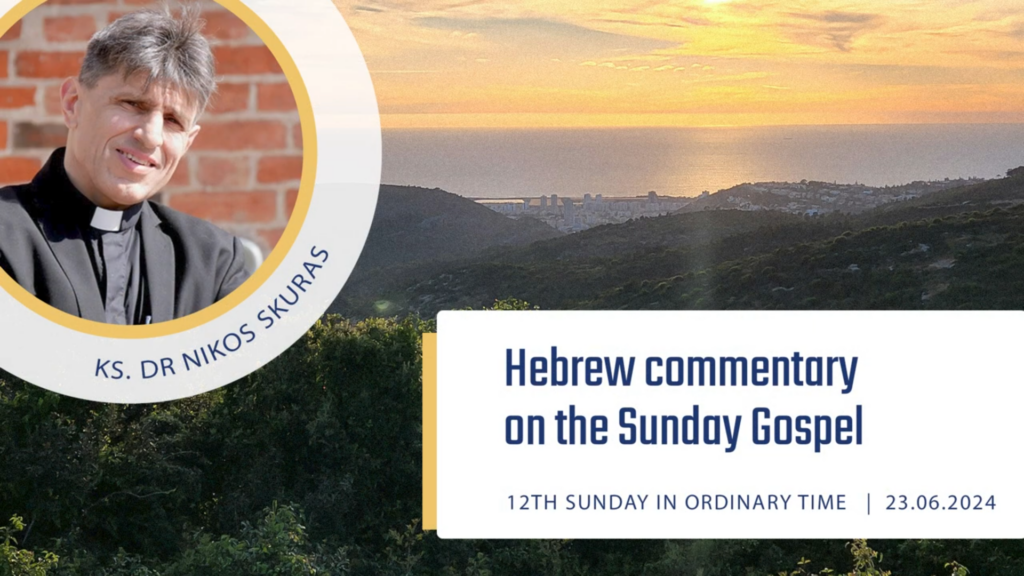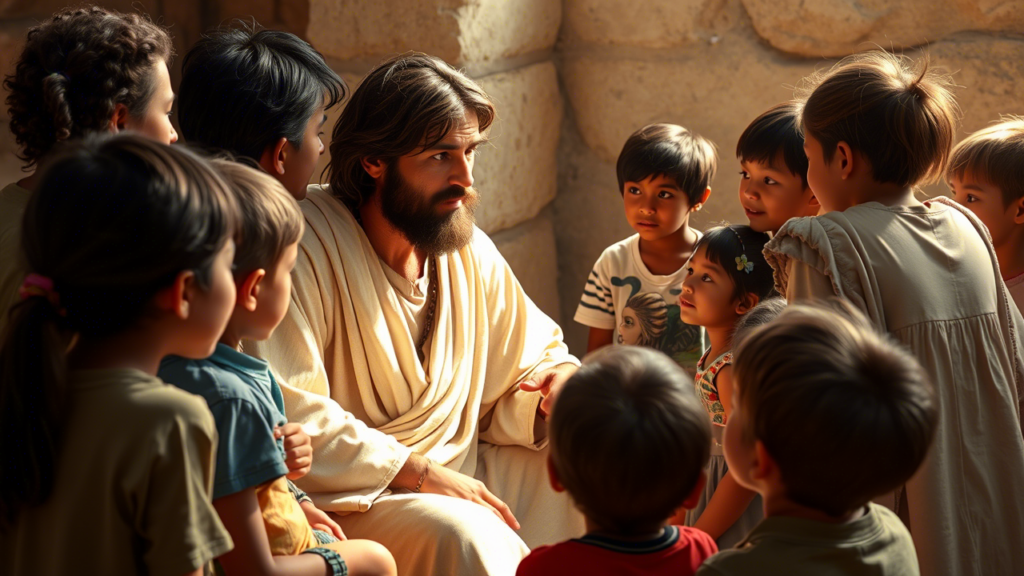Passing through the sea and quieting the storm – God comes to the rescue
“The apostles, in their helplessness in the face of their threatened death, cry out to the Teacher. Also, the ancestors of the Apostles once shouted to God against the waters of the Red Sea, with Pharaoh’s deadly chariots behind them. God made another Passover, opened the sea to them,” stresses Fr. Nikos Skuras, Doctor of Theology […]

“The apostles, in their helplessness in the face of their threatened death, cry out to the Teacher. Also, the ancestors of the Apostles once shouted to God against the waters of the Red Sea, with Pharaoh’s deadly chariots behind them. God made another Passover, opened the sea to them,” stresses Fr. Nikos Skuras, Doctor of Theology in Biblical Studies, in a commentary for the Heschel Center of the Catholic University of Lublin’s, for Sunday, June 23. This Sunday Gospel refers to the Old Testament description of the Israelites’ passage through the sea.
The Hebrew language script in which the Old Testament Bible was written had only consonants. Similarly, the Greek text of the New Testament was a continuous script without punctuation marks. For a proper reading of the written content, the reader had to be in relationship with someone who knew the intention of the creator of the text. For this reason, Ezra introduced the custom of reading the Torah in public along with the interpretation of the sacred texts: “So they read from this book, the book of God’s Law, emphatically, with the addition of an explanation, so that the people understood the reading” (Ne. 8:8).
The people of the First Covenant carrying the Hebrew Bible have their own exegetical tradition. The one making the interpretation is aware that he does not diminish the revelation he has received. His commentary only helps to understand and see the actuality of what God reveals. The principle of interpreting a given biblical passage by referring to other biblical quotations was often in effect. Targums and midrashes explained given fragments of the biblical text. Their authors used various rules, such as: looking for parallel passages, for introducing a new interpretation (gezerah shavah), modifying the reading of the text (Kal tiqrey), applying a second meaning (tartey mishma).
In commenting on today’s Gospel, I would also like to refer to other fragments of Kidvey Kodesh.
In today’s Gospel, Jesus, when evening fell, sleeps in the boat. All day He had been doing the will of God who sent Him. He healed and taught. He sailed to the pagan land of the Gerazenes.
Jonah also sleeps in the boat. He spent the entire day “fleeing from the Lord.” For God was sending a prophet to the pagan land of the Ninevites. He was to call them to accept God’s love. For their iniquity had “reached before His face.” The Creator, who gives “the people reviving breath,” wishes to forgive the Ninevites “who do not distinguish their right hand from their left.”
The Sea of Galilee suddenly became agitated and Jesus and His disciples were in danger of sinking.
I experienced this myself on one of my pilgrimages. Being on a solid built of steel small ship in the middle of the Lake. Suddenly the waves got so big that I felt a great fear of sinking. The ship was shaken so much that one woman’s chair on which she was sitting suddenly escaped to the side. She herself fell to the floor.
Jesus’ disciples fought for their lives, but to no avail.
“Terrified were the sailors” sailing on the ship with Jonah. They tried to fight the elements, but to no avail. “Each cried out to his deity,” also without result. They awoke Jonah, and from his mouth they learned about “the Lord, the God of heaven, who created the sea and the land.” The prophet also announced to them that he, or rather his disobedience, had contributed to the occurrence of the storm. The storm was sent by his God. They asked: “What should we do to you so that the sea will stop storming around us?” He replied that they must throw him into the raging sea. This practically meant sentencing Jonah to death. They refused to do so by trying to turn back to shore. Unfortunately, to no avail. They decided that in order to save their lives they had to sacrifice the life of a man who was not at fault to them – he did not deserve the death penalty. They begged God, whom Jonah had announced to them, not to hold them “responsible for the blood of the innocent.” When they threw him overboard, Jonah’s prophecy was fulfilled. The sea suddenly calmed down. The pagan sailors “offered a sacrifice to the Lord and made vows” and acknowledged the power of Israel’s God. Jonah, freed by God from the “depths of Sheol,” fulfilled the task assigned to him by God. He announced to the Ninevites the full truth about God. First, that iniquity is not pleasing to Him. Second, that He is “gentle and merciful, patient and full of graciousness, pitying misery.”
The apostles, in their helplessness in the face of their threatened death, cry out to the Teacher. He, before their eyes, had already performed many signs indicating that God was with him. With a single word, the awakened Master quiets the whirlwind and brings peace to the lake. As Psalm 107:23-30 says, the storm and the gentle breeze are in the hand of God. Jesus surprises his disciples once again. This is another stage of their maturation in faith.
Also, the ancestors of the Apostles once shouted to God against the waters of the Red Sea, with Pharaoh’s deadly chariots behind them. God made another Passover, opened the sea to them. Every Passover Night, God reminds the children of Israel that His deliverance arm has not shortened.
The storm described can also be a symbol of the various storms in everyone’s life. In its quieting today, one can also see the deepest meaning of each Passover. As Rabbi Dante Lattes wrote: “from the day of Egyptian freedom to another day when the unity of redeemed human spirits will triumph over all bondage and violence, over all hatred and terror, over all sorrow and weeping, and when former enemies and tyrants will meet no longer on battlefields, but will form a new humanity blessed by God.”
https://www.youtube.com/watch?v=_eAZ0-aIFTg
About the author:
Rev. Dr. Nikos Skuras – Doctor of Theology in Biblical Studies on the basis of the dissertation, entitled. “The revelation of the mission ad gentes to Peter (Acts 10:1-48). An exegetical and theological study.” He works currently as Pastor of a Spanish-speaking parish in Aachen, Germany.
Related

Explaining Holy Week to Our Children: A Journey of Faith and Hope
Laetare
11 April, 2025
4 min

Christian Leadership in Business: A Model of Humility, Justice, and Solidarity
Javier Ferrer García
10 April, 2025
3 min

Guiding Our Decisions with God’s Will in Daily Life
Patricia Jiménez Ramírez
10 April, 2025
4 min

What are you going to do with your life?
Luis Herrera Campo
10 April, 2025
2 min
 (EN)
(EN)
 (ES)
(ES)
 (IT)
(IT)

